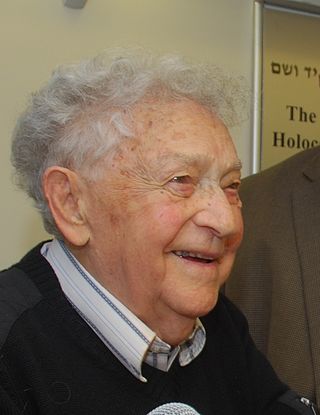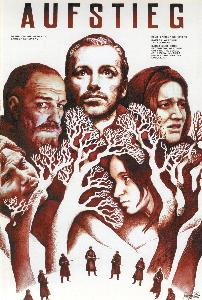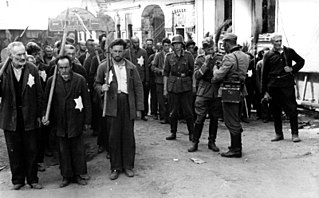
Andrey Andreyevich Vlasov was a Soviet Russian Red Army general. During the Axis-Soviet campaigns of World War II he fought (1941–1942) against the Wehrmacht in the Battle of Moscow and later was captured attempting to lift the siege of Leningrad. After his capture, he defected to the Third Reich and nominally headed the collaborationist Russian Liberation Army, also becoming the political leader of the Russian collaborationist anti-Soviet movement. Initially this army existed only on paper and was used by Germans to goad Red Army troops to surrender, while any political and military activities were officially forbidden to him by the Nazis after his visits to the occupied territory; only in November 1944 did Heinrich Himmler, aware of Germany's shortage of manpower, arrange for Vlasov formations composed of Soviet prisoners of war as armed forces of Committee for the Liberation of the Peoples of Russia, a political organisation headed by Vlasov. While for the Nazis the ROA was a mere propaganda weapon, Vlasov and his associates attempted to create an armed political movement independent of the Nazi control that would present an anti-Stalinist program described by Robert Conquest as "democratic" while attempting to avoid Nazi antisemitism and chauvinism, with "completing the Revolution" of 1917 being the ultimate goal of the movement. In January 1945, Vlasov headed the army as it was declared that it would be no longer a part of Wehrmacht. At the war's end, the 1st division of ROA aided the May 1945 Prague uprising against the Germans. Vlasov and the ROA were captured by Soviet forces with the United States' assistance. Vlasov was tortured, and hanged for treason after a secret trial.

The Committee for the Liberation of the Peoples of Russia was a committee composed of military and civilian Nazi collaborators from territories of the Soviet Union. It was founded by Nazi Germany on 14 November 1944, in Prague, Protectorate of Bohemia and Moravia.

Yitzhak Arad was an Israeli historian, author, IDF brigadier general and Soviet partisan. He also served as Yad Vashem's director from 1972 to 1993, and specialised in the history of the Holocaust.

The Soviet Union (USSR) competed at the 1972 Summer Olympics in Munich, West Germany. 371 competitors, 298 men and 73 women, took part in 180 events in 22 sports.

The Soviet Union (USSR) competed at the 1976 Summer Olympics in the city of Montreal, Quebec, Canada. 410 competitors, 285 men and 125 women, took part in 189 events in 22 sports. As the country hosted the next Olympics in Moscow, a live video feed from the city was shown at the closing ceremony.

The Ascent is a 1977 Soviet drama film directed by Larisa Shepitko and made at Mosfilm. Shepitko and Yuri Klepikov's screenplay was adapted from the 1970 novel Sotnikov by Vasil Bykaŭ. The film was shot in black-and-white in January 1974 near Murom, Russia, in appalling winter conditions.

The German invasion of the Soviet Union started on 22 June 1941 and led to a German military occupation of Byelorussia until it was fully liberated in August 1944 as a result of Operation Bagration. The western parts of Byelorussia became part of the Reichskommissariat Ostland in 1941, and in 1943, the German authorities allowed local collaborators to set up a regional government, the Belarusian Central Rada, that lasted until the Soviets reestablished control over the region. Altogether, more than two million people were killed in Belarus during the three years of Nazi occupation, around a quarter of the region's population, or even as high as three million killed or thirty percent of the population, including 500,000 to 550,000 Jews as part of the Holocaust in Belarus. In total, on the territory of modern Belarus, more than 9,200 villages and settlements, and 682,000 buildings were destroyed and burned, with some settlements burned several times.

Rolan Antonovich Bykov was a Soviet and Russian stage and film actor, director, screenwriter and pedagogue. People's Artist of the USSR (1990).

The Soviet Union (USSR) competed at the 1968 Summer Olympics in Mexico City. 312 competitors, 246 men and 66 women, took part in 164 events in 18 sports.

The Russian census identified that there were more than 5,864,000 Ukrainians living in Russia in 2015, representing over 4.01% of the total population of the Russian Federation and comprising the eighth-largest ethnic group. On 2022 February there were roughly 2.8 million Ukrainians who fled to Russia.

The Troyekurovo Cemetery, alternatively known as Novo-Kuntsevo Cemetery, is a cemetery in Moscow, Russia.

Only "Old Men" Are Going Into Battle is an iconic 1973 Soviet war drama black-and-white film produced in the USSR about World War II fighter pilots, written and directed by Leonid Bykov, who also played the lead role as the squadron commander.

Yuri Pavlovich German was a Soviet and Russian writer, playwright, screenwriter, and journalist.

The honorary title Pilot-Cosmonaut of the USSR was a state award of the Soviet Union presented to all cosmonauts who flew for the Soviet Space Agency. Usually accompanying the distinction was the title of Hero of the Soviet Union, the highest title that could be awarded to a Soviet citizen for performing heroic deeds while in service of the state.
Eduard Yakovlevich Volodarsky was a Soviet and Russian screenwriter, writer and playwright. He was named Honoured Artist of the RSFSR in 1987, awarded the Order of Honour in 2002 and 4th class Order "For Merit to the Fatherland" in 2011 for his contribution to the development of national cinema.

Confrontation or is a 1985 Soviet six-part television film directed by Semyon Aranovich based on the novel by Yulian Semyonov.

Hryhoriy Mykytovych Vasiura was a Soviet senior lieutenant in the Red Army who was captured during the Nazi invasion of the USSR in 1941 and subsequently volunteered for service in the Schutzmannschaft and the Waffen-SS. Vasiura's wartime activities were not fully revealed until the mid-1980s, when he was convicted as a war criminal by a Soviet military court and executed in 1987 for his role in the Khatyn massacre.
The Prince and the Pauper is a 1972 Soviet children's adventure film directed by Vadim Gauzner.

Wolf Messing: Who Saw Through Time is a Russian TV series about fate of Wolf Messing, based on the novel of the same name by the screenwriter Eduard Volodarsky. by the Russia-1 TV channel. The series premiered on the Russia-1 on November 15, 2009.
















